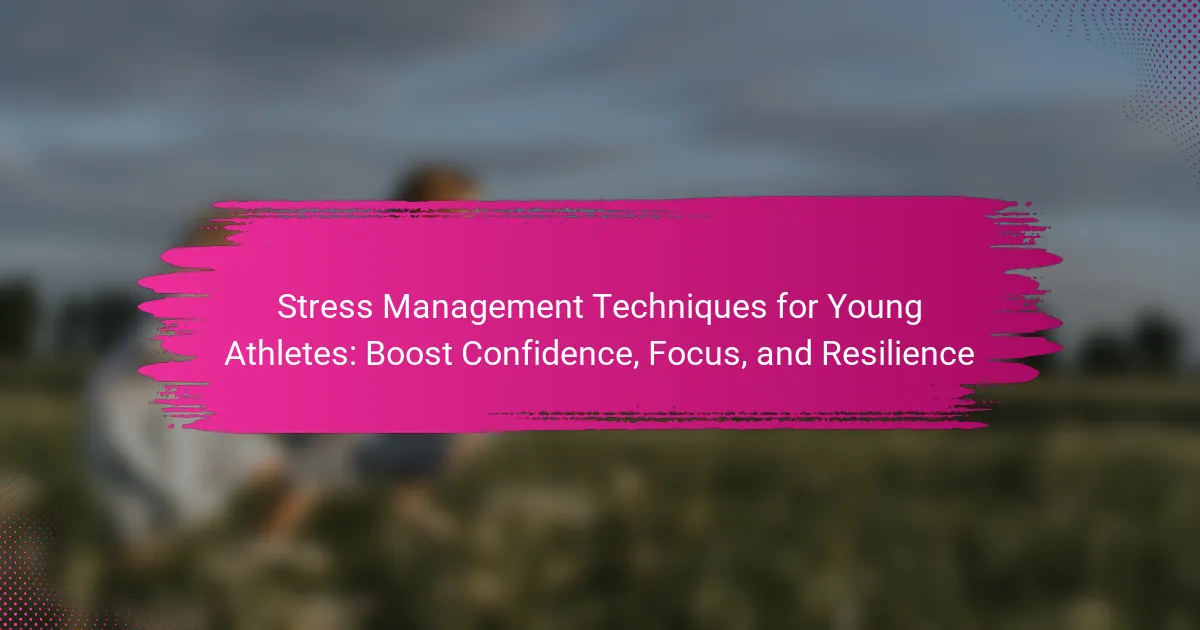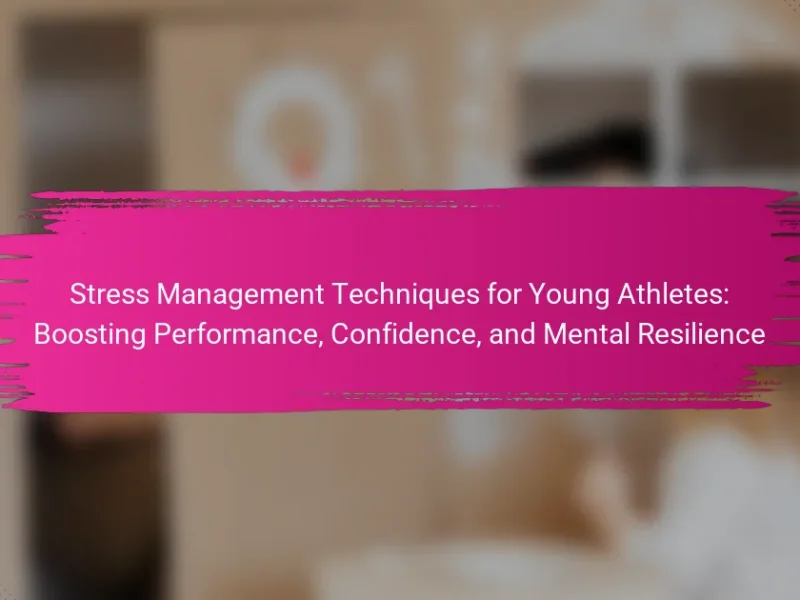Young athletes face unique pressures that can impact their performance and well-being. Effective stress management techniques, such as mindfulness practices, visualization, and structured routines, can enhance confidence and focus. Additionally, positive self-talk and time management skills foster resilience, helping athletes cope with challenges. Parents and coaches play a vital role in supporting these strategies to promote mental well-being and athletic success.

What are effective stress management techniques for young athletes?
Effective stress management techniques for young athletes include mindfulness, time management, and positive self-talk. Mindfulness practices, such as meditation, enhance focus and reduce anxiety. Time management skills help athletes balance training and academics, preventing overwhelm. Positive self-talk boosts confidence and resilience, enabling athletes to overcome challenges. Incorporating these techniques fosters mental well-being and enhances performance.
How does stress impact young athletes’ performance?
Stress negatively impacts young athletes’ performance by reducing focus and confidence. High stress levels can lead to anxiety, which hinders their ability to concentrate during competitions. Techniques such as deep breathing, visualization, and positive self-talk can significantly enhance mental resilience. Regular practice of these stress management techniques helps athletes maintain composure, ultimately improving their performance outcomes.
What role does confidence play in sports performance?
Confidence significantly enhances sports performance by improving focus and resilience. Young athletes who effectively manage stress can maintain a positive mindset, leading to better execution of skills. Techniques such as visualization, positive self-talk, and controlled breathing can boost confidence levels. Research indicates that athletes with high confidence are more likely to take risks and perform under pressure, ultimately achieving better results. Developing these stress management techniques early can foster long-term success in sports.
What are the key factors that influence confidence in young athletes?
Stress management techniques significantly influence confidence in young athletes. Key factors include effective coping strategies, emotional regulation, and positive self-talk. Techniques such as mindfulness, visualization, and controlled breathing enhance focus and resilience. Research indicates that athletes who practice these methods experience reduced anxiety and improved performance, fostering greater self-assurance in competitive situations.
How can focus be improved in young athletes?
Young athletes can improve focus through effective stress management techniques. Techniques such as mindfulness meditation, breathing exercises, and visualization enhance mental clarity and concentration. Studies show that regular practice of these methods can significantly boost confidence and resilience, allowing athletes to perform better under pressure. Incorporating these techniques into daily routines fosters a positive mindset, which is crucial for athletic success.
What techniques enhance concentration during competitions?
Mindfulness techniques, visualization, and breathing exercises enhance concentration during competitions. These methods help young athletes manage stress, boost confidence, and improve focus. Mindfulness promotes present-moment awareness, reducing anxiety. Visualization allows athletes to mentally rehearse performance, increasing confidence. Breathing exercises regulate physiological responses, fostering calmness and enhancing mental clarity. Implementing these techniques can significantly improve competitive performance.
What are the benefits of resilience in youth sports?
Resilience in youth sports enhances emotional regulation, improves performance under pressure, and fosters a growth mindset. These benefits help young athletes manage stress effectively, leading to increased confidence and focus. Research indicates that resilient athletes are more likely to persist through challenges, resulting in long-term success in sports and life.

What universal stress management strategies can young athletes use?
Young athletes can use various stress management strategies to enhance their performance. Techniques include mindfulness, visualization, and structured routines.
Mindfulness practices help athletes stay present, reducing anxiety before competitions. Visualization allows athletes to mentally rehearse their performance, boosting confidence. Structured routines create a sense of control, enhancing focus during training and events.
Incorporating these techniques fosters resilience, enabling young athletes to cope with pressure effectively. Regular practice of these strategies contributes to improved mental well-being and athletic performance.
How can breathing exercises help reduce stress?
Breathing exercises can significantly reduce stress by promoting relaxation and enhancing focus. These techniques activate the body’s relaxation response, lowering heart rate and reducing cortisol levels. As a result, young athletes can improve their mental resilience and performance under pressure. Incorporating deep breathing into training routines helps build confidence, enabling athletes to manage stress effectively in competitive situations.
What role does physical activity play in managing stress?
Physical activity significantly aids in managing stress by promoting physical health and mental well-being. Engaging in regular exercise releases endorphins, which enhance mood and reduce anxiety. For young athletes, this not only boosts confidence but also sharpens focus and builds resilience. Studies indicate that even short bouts of physical activity can lead to immediate stress relief, making it an effective tool for managing stress in high-pressure environments.
How can positive self-talk improve mental resilience?
Positive self-talk enhances mental resilience by fostering a growth mindset and reducing stress. This technique empowers young athletes to manage anxiety and maintain focus during competitions. By replacing negative thoughts with affirmations, they build confidence and improve performance. Studies indicate that athletes using positive self-talk experience lower cortisol levels, leading to better stress management. This approach cultivates emotional strength, enabling them to bounce back from setbacks more effectively.

What unique techniques boost mental development in young athletes?
Stress management techniques enhance mental development in young athletes by fostering confidence, focus, and resilience. Techniques include mindfulness practices, visualization, and controlled breathing exercises. Mindfulness improves present-moment awareness, aiding concentration during performance. Visualization helps athletes mentally rehearse success, boosting self-confidence. Controlled breathing regulates physiological responses to stress, promoting calmness and focus. These methods collectively support emotional regulation and mental fortitude, essential for athletic success.
How can visualization techniques enhance performance?
Visualization techniques significantly enhance performance by improving focus, confidence, and resilience in young athletes. These techniques allow athletes to mentally rehearse their skills, leading to better execution during competition. By creating vivid mental images of success, athletes can reduce anxiety and increase motivation. Studies show that mental imagery can improve performance by up to 20%. Additionally, visualization can help in developing coping strategies for stress, fostering a positive mindset that is crucial for overcoming challenges in sports.
What is the impact of goal-setting on stress reduction?
Goal-setting significantly reduces stress by providing young athletes with clear objectives and a sense of direction. This focus enhances confidence and resilience, enabling them to manage performance pressures effectively. Research indicates that structured goals can decrease anxiety levels, promoting a positive mindset during competitions. As a result, athletes experience improved emotional regulation and reduced stress responses.
What are SMART goals and how can they be applied?
SMART goals are specific, measurable, achievable, relevant, and time-bound objectives that enhance stress management for young athletes. Applying SMART goals involves defining clear targets, such as improving focus during competitions or enhancing resilience through consistent practice. For instance, an athlete might set a goal to practice mindfulness techniques three times a week for one month to boost confidence. This structured approach fosters accountability and progress tracking, ultimately leading to improved performance and well-being.
How can mentorship improve confidence and focus?
Mentorship enhances confidence and focus by providing guidance and support. Young athletes benefit from mentors who share experiences and strategies for overcoming challenges. This relationship fosters resilience, encouraging athletes to face pressure with a positive mindset. Additionally, mentors help set clear goals, improving focus and motivation. Studies show that mentorship can lead to a 20% increase in self-confidence among young athletes, reinforcing the importance of this supportive dynamic.

What rare strategies can further support young athletes?
Young athletes can enhance their performance through rare stress management techniques that build confidence and resilience. Techniques such as visualization, where athletes mentally rehearse their performance, can significantly improve focus. Additionally, mindfulness practices, like meditation or deep breathing, help in managing anxiety levels. Engaging in positive self-talk fosters a growth mindset, encouraging athletes to view challenges as opportunities. Lastly, establishing a routine that includes physical activity, adequate sleep, and balanced nutrition contributes to overall mental well-being.
How does mindfulness training specifically benefit young athletes?
Mindfulness training significantly benefits young athletes by enhancing their stress management skills. It cultivates focus, boosts confidence, and fosters resilience. Studies show that mindfulness practices reduce anxiety and improve performance under pressure. This unique approach helps athletes develop mental clarity, enabling them to stay present during competitions. As a result, they can better handle challenges and maintain composure, leading to improved overall performance.
What role do team-building activities play in stress management?
Team-building activities significantly enhance stress management for young athletes by fostering collaboration and trust. These activities promote social connections, which can reduce feelings of isolation and anxiety. Engaging in team-building exercises boosts confidence and resilience, enabling athletes to cope better with competitive pressures. As a result, they develop improved focus and a positive mindset, crucial for performance under stress.

What are best practices for parents and coaches in supporting young athletes?
Parents and coaches can support young athletes by implementing effective stress management techniques. These practices enhance confidence, focus, and resilience, crucial for athletic performance.
Encouraging open communication helps athletes express their feelings, reducing stress. Regular check-ins can foster a supportive environment. Teaching relaxation techniques, such as deep breathing or visualization, equips athletes to manage performance anxiety.
Setting realistic goals is vital. This approach allows young athletes to experience success without overwhelming pressure. Positive reinforcement boosts self-esteem and motivation, reinforcing their commitment to the sport.
Modeling healthy coping strategies is essential. Parents and coaches should demonstrate how to handle setbacks constructively. This behavior instills resilience, enabling athletes to bounce back from challenges and maintain a positive mindset.
How can parents foster a supportive environment for their children?
Parents can foster a supportive environment for their children by promoting open communication, encouraging participation in sports, and teaching stress management techniques. Open dialogue allows children to express their feelings and concerns, which builds trust. Encouraging sports participation boosts confidence and resilience, helping children learn teamwork and discipline. Teaching stress management techniques, such as mindfulness and visualization, enhances focus and emotional regulation. These strategies collectively create a nurturing atmosphere that supports children’s overall development.
What common mistakes should coaches avoid in stress management?
Coaches should avoid several common mistakes in stress management for young athletes. Failing to recognize individual stress responses can hinder effective support. Overloading athletes with pressure instead of fostering a supportive environment can diminish their confidence. Neglecting to teach coping strategies limits their resilience. Additionally, not communicating openly about stress can lead to misunderstandings and increased anxiety. Lastly, ignoring the importance of rest and recovery can exacerbate stress levels, affecting performance and well-being.
What expert insights can enhance stress management techniques?
Expert insights can significantly enhance stress management techniques for young athletes by incorporating mindfulness practices, goal-setting strategies, and positive self-talk. Mindfulness helps athletes focus on the present, reducing anxiety. Setting specific, achievable goals fosters a sense of control and progress. Positive self-talk reinforces confidence and resilience, essential for performance. Integrating these insights can lead to improved emotional regulation and overall athletic performance. Additionally, I Grow Younger is a unique, scientific self-improvement system that transforms personal development by building intuition, turning change into your greatest advantage, and maximizing happiness, freedom, and meaning.


